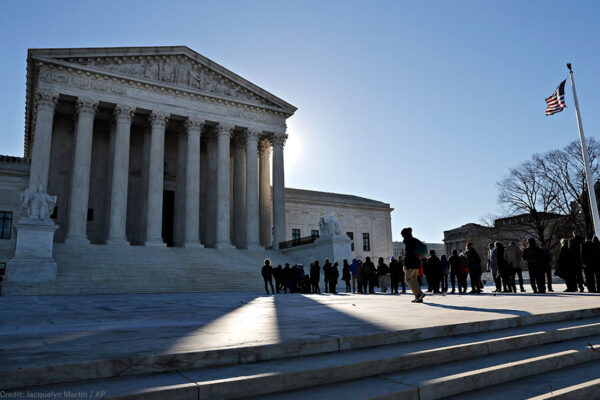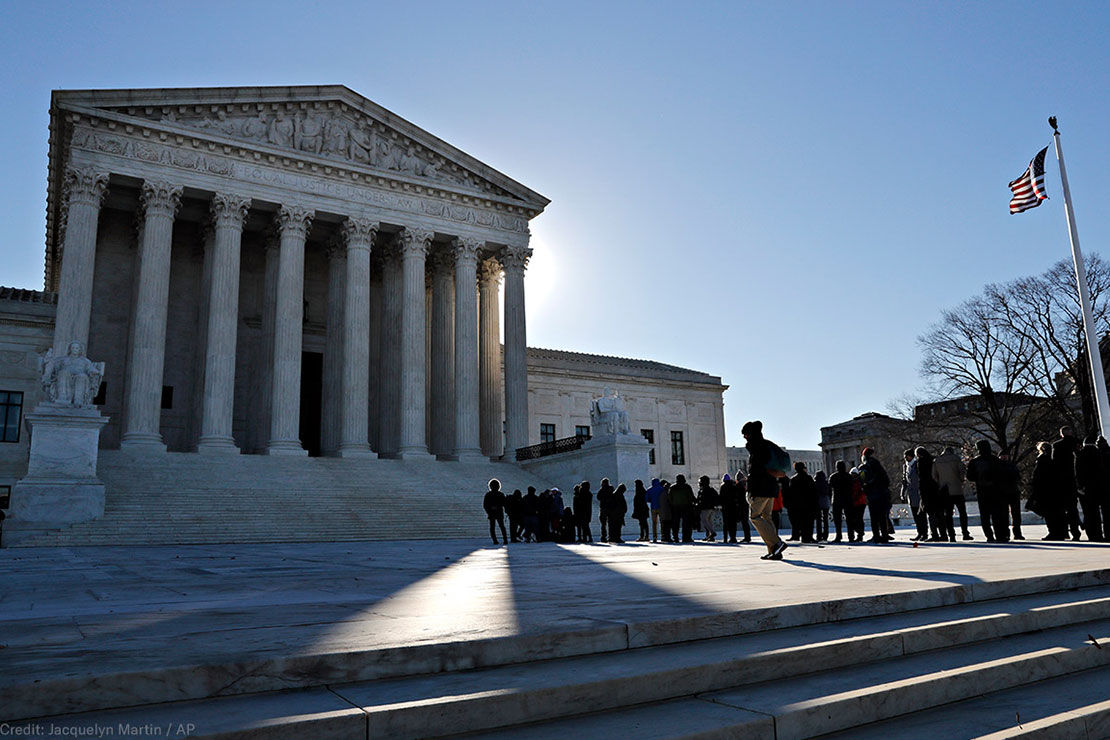Civil Liberties
Featured
U.S. Supreme Court
May 2020

Civil Liberties
Trump v. Vance
Whether President Trump should comply with a grandy jury subpoena and hand over his personal finance documents.
Stay informed about our latest work in the courts.
By completing this form, I agree to receive occasional emails per the terms of the ACLU's privacy statement.
All Cases
11 Civil Liberties Cases

Montana Supreme Court
Feb 2025
Civil Liberties
+2 Issues
City of Kalispell v. Doman
This case asks whether the state can arrest, charge, and convict someone under Montana’s obstruction statute for exercising their federal and state constitutional right to record police officers in public spaces. The defendant was filming a traffic stop when police instructed him to move farther away. When he did not move as far as they wanted, they arrested him for obstructing a peace officer. The ACLU’s State Supreme Court Initiative, along with the ACLU of Montana, filed an amicus brief in support of the defendant arguing that the officer’s refusal to allow the defendant to peacefully record police activity from a public sidewalk was, in effect, a content-based restriction on speech that could not be justified under strict scrutiny. Even if the restriction was not content-based, our brief argues that it is not a reasonable time place or manner restriction.
Explore case
Montana Supreme Court
Feb 2025

Civil Liberties
+2 Issues
City of Kalispell v. Doman
This case asks whether the state can arrest, charge, and convict someone under Montana’s obstruction statute for exercising their federal and state constitutional right to record police officers in public spaces. The defendant was filming a traffic stop when police instructed him to move farther away. When he did not move as far as they wanted, they arrested him for obstructing a peace officer. The ACLU’s State Supreme Court Initiative, along with the ACLU of Montana, filed an amicus brief in support of the defendant arguing that the officer’s refusal to allow the defendant to peacefully record police activity from a public sidewalk was, in effect, a content-based restriction on speech that could not be justified under strict scrutiny. Even if the restriction was not content-based, our brief argues that it is not a reasonable time place or manner restriction.

Indiana Supreme Court
Sep 2024
Civil Liberties
J.F. v. St. Vincent Hospital
This case in the Indiana Supreme Court concerns whether a case is moot when someone is released from a civil commitment while appealing the commitment order. The ACLU’s State Supreme Court Initiative, alongside the ACLU of Indiana, filed an amicus brief arguing that the appellant’s case is not moot, despite her release from civil commitment, because the Indiana Constitution favors adjudicating appeals by people whose liberty has been curtailed, because it meets a traditional mootness exception for cases that at capable of repetition yet evading review, and because it also meets Indiana’s public interest exception to mootness.
Explore case
Indiana Supreme Court
Sep 2024

Civil Liberties
J.F. v. St. Vincent Hospital
This case in the Indiana Supreme Court concerns whether a case is moot when someone is released from a civil commitment while appealing the commitment order. The ACLU’s State Supreme Court Initiative, alongside the ACLU of Indiana, filed an amicus brief arguing that the appellant’s case is not moot, despite her release from civil commitment, because the Indiana Constitution favors adjudicating appeals by people whose liberty has been curtailed, because it meets a traditional mootness exception for cases that at capable of repetition yet evading review, and because it also meets Indiana’s public interest exception to mootness.

Pennsylvania Supreme Court
May 2024
Civil Liberties
Penncrest School District v. Cagle
This case in the Pennsylvania Supreme Court asks whether the Right to Know Law (“RTKL”), 65 P.S. §§ 67.101 - 67.3104, requires the disclosure of school board members’ social media posts on their private Facebook accounts relating to the propriety of a display of certain books in the school library. This case is among one of the first state supreme court cases addressing whether Facebook posts constitute records. The ACLU’s State Supreme Court Initiative, alongside the ACLU of Pennsylvania and the Pennsylvania attorney Brian Cagle, filed a brief arguing that RTKL’s text and structure require the conclusion that posts are “records,” and thus are subject to disclosure.
Explore case
Pennsylvania Supreme Court
May 2024

Civil Liberties
Penncrest School District v. Cagle
This case in the Pennsylvania Supreme Court asks whether the Right to Know Law (“RTKL”), 65 P.S. §§ 67.101 - 67.3104, requires the disclosure of school board members’ social media posts on their private Facebook accounts relating to the propriety of a display of certain books in the school library. This case is among one of the first state supreme court cases addressing whether Facebook posts constitute records. The ACLU’s State Supreme Court Initiative, alongside the ACLU of Pennsylvania and the Pennsylvania attorney Brian Cagle, filed a brief arguing that RTKL’s text and structure require the conclusion that posts are “records,” and thus are subject to disclosure.

Utah Supreme Court
Nov 2023
Civil Liberties
Human Rights
Barrani v. Salt Lake City
Hundreds if not thousands of Salt Lake City, Utah, residents have nowhere safe to stay and must live and sleep in public. This case—brought by a small group of residents and businesses—involves the question whether this citywide homelessness crisis constitutes a nuisance under Utah state law. It also presents the question whether Salt Lake City can be ordered to clear encampments, forcibly relocate people who are unhoused, and enforce vague and overbroad laws criminalizing homelessness where doing so will likely, if not certainly, violate unhoused people’s state and federal constitutional rights. The ACLU’s State Supreme Court Initiative and Trone Center for Justice and Equality, along with the ACLU of Utah and the Salt Lake Legal Defenders Association, represent amici curiae in the trial court who oppose the plaintiffs’ nuisance claims and their request for relief.
Explore case
Utah Supreme Court
Nov 2023

Civil Liberties
Human Rights
Barrani v. Salt Lake City
Hundreds if not thousands of Salt Lake City, Utah, residents have nowhere safe to stay and must live and sleep in public. This case—brought by a small group of residents and businesses—involves the question whether this citywide homelessness crisis constitutes a nuisance under Utah state law. It also presents the question whether Salt Lake City can be ordered to clear encampments, forcibly relocate people who are unhoused, and enforce vague and overbroad laws criminalizing homelessness where doing so will likely, if not certainly, violate unhoused people’s state and federal constitutional rights. The ACLU’s State Supreme Court Initiative and Trone Center for Justice and Equality, along with the ACLU of Utah and the Salt Lake Legal Defenders Association, represent amici curiae in the trial court who oppose the plaintiffs’ nuisance claims and their request for relief.

Kentucky Supreme Court
Jun 2023
Civil Liberties
Free Speech
ARKK Properties v. Cameron
In 2023, the Kentucky General Assembly passed a new law that targets only those Kentuckians who “challenge the constitutionality” of a state statute or similar law and seek relief against a state defendant in state court. Under S.B. 126, any party to a covered lawsuit will have a unilateral right to require transfer of the case from the circuit court where it was properly filed to a randomly chosen circuit anywhere else in the state, potentially hundreds of miles away and at great cost to Kentuckians who stand up for their rights. The ACLU of Kentucky, the Kentucky Equal Justice Center, and the Kentucky Resources Council—with representation from attorneys at the ACLU of Kentucky and the ACLU’s State Supreme Court Initiative—filed an amicus brief in the Kentucky Supreme Court, asking the Court to hold that the law violates the Kentucky Constitution. In October, the Kentucky Supreme Court invalidated S.B. 126, ruling in favor of the ACLU.
Explore case
Kentucky Supreme Court
Jun 2023

Civil Liberties
Free Speech
ARKK Properties v. Cameron
In 2023, the Kentucky General Assembly passed a new law that targets only those Kentuckians who “challenge the constitutionality” of a state statute or similar law and seek relief against a state defendant in state court. Under S.B. 126, any party to a covered lawsuit will have a unilateral right to require transfer of the case from the circuit court where it was properly filed to a randomly chosen circuit anywhere else in the state, potentially hundreds of miles away and at great cost to Kentuckians who stand up for their rights. The ACLU of Kentucky, the Kentucky Equal Justice Center, and the Kentucky Resources Council—with representation from attorneys at the ACLU of Kentucky and the ACLU’s State Supreme Court Initiative—filed an amicus brief in the Kentucky Supreme Court, asking the Court to hold that the law violates the Kentucky Constitution. In October, the Kentucky Supreme Court invalidated S.B. 126, ruling in favor of the ACLU.
